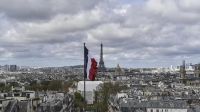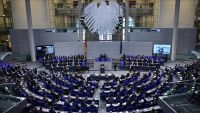The UK's party leaders have clashed in the first TV election debate on a range of issues including the NHS, immigration and the deficit.
It is the only time David Cameron and Ed Miliband will appear together on TV ahead of 7 May's polling day.
The Conservative and Labour leaders, as well as the leaders of the Lib Dems, UKIP, the Green Party, the SNP and Plaid Cymru, also debated zero-hours contracts, spending cuts and education in the ITV-hosted contest.
Seven million viewers watched the debate, according to ITV, which was a 31% share of the audience. There was a peak audience of 7.4 million, or 33% of the audience.
Snap polls taken after the debate gave a mixed verdict.
A YouGov poll of 1,100 people gave a clear victory to the SNP leader Nicola Sturgeon, with 28%, followed by UKIP leader Nigel Farage on 20%, Mr Cameron on 18%, Mr Miliband on 15%, Mr Clegg on 10%, Green Party leader Natalie Bennett on 5% and Plaid Cymru's Leanne Wood on 4%.
'Pick and mix'
But a ComRes poll for ITV made it a dead heat between Mr Cameron, Mr Miliband, Mr Farage and Ms Sturgeon, although Mr Cameron came out on top on the question of who was most capable of leading the country.
Mr Miliband was judged best performer in an ICM poll for the Guardian, taking 25% of support, just ahead of David Cameron on 24%.
Analysis by BBC Political Editor Nick Robinson
There was no game-changer. No single "moment", no zinger, no gaffe which looks set to re-shape the course of this election. Save perhaps for one.
That was the presence on the stage of not two or three party leaders but seven - a debate in which the talk of a new sort of politics, multi-party politics, became visible reality.
If that gives a boost for UKIP's Nigel Farage with his laser focus on immigration and his attack on the "Westminster parties" - as the early instant polls suggest - it will worry the Tories.
If it also promotes Natalie Bennett's Greens, Nicola Sturgeon's SNP and Leanne Wood's Plaid Cymru after their assault on austerity - it will frighten Labour. The consequence could be an outcome more unpredictable and more uncertain than any election for years.
Some of the sharpest exchanges in the two-hour event came when Lib Dem Nick Clegg clashed with Mr Cameron.
Mr Clegg accused Mr Cameron of wanting to cut the money going into schools - Mr Cameron denied this and accused the Lib Dem leader of taking a "pick and mix approach" to decisions they had made together in cabinet.
Mr Miliband attacked Mr Clegg for "betraying young people" over tuition fees - a clearly riled Mr Clegg attacked the Labour leader's "pious stance" and challenged Mr Miliband to apologise to the British public for "crashing the economy". Mr Miliband said Labour had admitted getting it wrong over bank regulation.
Ms Sturgeon took a firm line against austerity and signalled areas, such as increasing the top rate of income tax, where she could work with Labour but said getting more SNP MPs elected to Westminster was needed to "keep them honest".
Ms Wood and Ms Bennett joined Ms Sturgeon in stressing their anti-austerity credentials.
Source: The BBC









